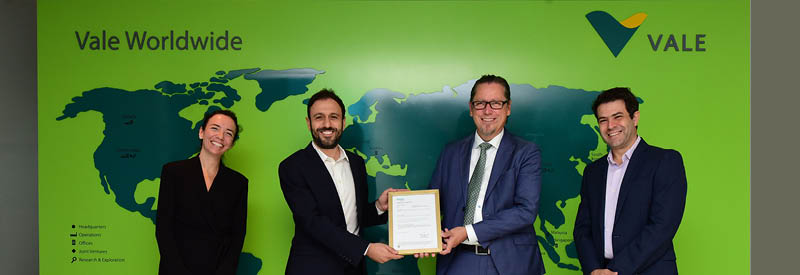DNV has granted Approval in Principle (AiP) for a pioneering Type B tank and multi-fuel containment system design for ships capable of using LNG, methanol or ammonia

The system will change the decarbonization roadmap for Brazilian mining giant VALE SA and has been developed in a joint industry project (JIP) together with DNV, Norwegian ship designer Brevik Engineering AS and cryogenic insulation solutions provider Passer Marine AS.
The system will change the decarbonisation roadmap for Brazilian mining giant VALE SA and has been developed in a joint industry project (JIP) together with DNV, Norwegian ship designer Brevik Engineering AS and cryogenic insulation solutions provider Passer Marine AS.
"The multi-fuel tank system removes some of the main barriers to the adoption of alternative fuels, which include regulatory and infrastructure uncertainty in defining the optimal fuel. Our fleet is comprised of a large portion of young very large iron ore carriers, and futureproofing must be at the core of our decision making. This technology provides each vessel the flexibility for whichever fuel is best suited for their trade," said Rodrigo Bermelho, Shipping Technical Manager at VALE.
"We are very excited to receive DNV's AiP and what it means for the future. We are in the process of developing a pilot project to implement the system on one of our existing Guaibamax vessels and look forward to taking the next step with the design,” he added.
Fuel choice is one of the most challenging factors shipowners face amid increasing pressure to decarbonize. The flexibility provided by the new system means vessels that VALE charters in future could be adapted to store and consume several different types of fuel. The AiP marks a considerable breakthrough given the system’s potential to improve the decision-making landscape.
"Low-carbon fuels will come at a premium and, given the significant investment necessary to achieve net-zero and the complexity of fuel choice, the drive to leave options open for as long as possible is understandable. The multi-fuel tank will allow VALE to mindfully move towards reducing their carbon footprint, while also keeping their options open,” said Morten Løvstad, Vice President and Segment Director for Bulk Carriers at DNV Maritime.
He adds that DNV is delighted to continue its long-lasting partnership with VALE in support of its various decarbonization initiatives. Bermelho says that in conjunction with other technologies the company is implementing, it is well positioned to achieve its environmental goals.
DNV has long advocated that decarbonization is a shared responsibility and that the industry can accelerate the transition by cooperatively sharing knowledge, technologies and experience.
"Charting the pathway to decarbonization is likely the greatest challenge the industry will face in our lifetime, and collaboration is essential in facing it," said Løvstad. He believes industry stakeholders with different expertise must join forces to generate the best opportunities for innovation.
“This JIP successfully yielded an innovative solution the market needs. It is the kind of collaboration that creates opportunities and propels the industry to create the necessary step-change.”
As an independent assessment of a concept within an agreed framework, an AiP confirms that a concept design is feasible and that no significant obstacles exist to prevent it from being realized. DNV's assessment of the VALE system found it to be compliant with all the applicable Ship Rules and Regulations.
The multi-fuel tank system is part of VALE’s Ecoshipping Program designed to reduce the company's carbon emissions through the adoption of new technologies. VALE sees this technology being applicable to future vessels, but also as having the capability to be deployed on the existing ships.